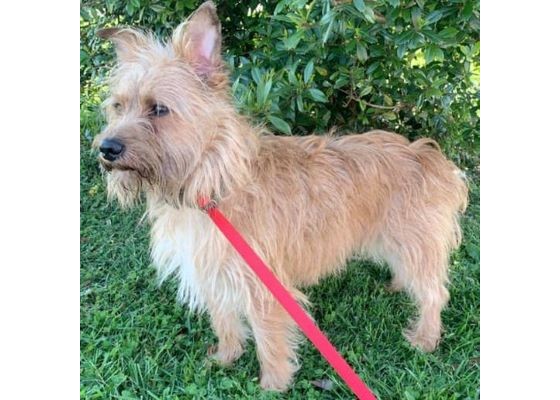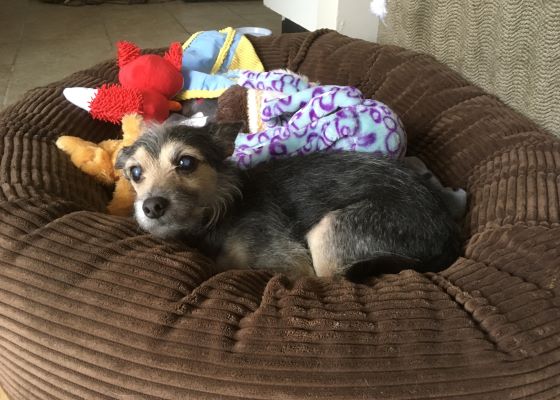Bella has been adopted!
The beautiful puppies are sponsored in loving memory of our beautiful aunt, Gwen Willms 💐
Bella and her six siblings arrived from Northern Ontario at 6 weeks of age. She has done very well in her foster home and is ready to find a family of her own. Bella will grow into a large (50 to 60 lb) fluffy dog with a sweet disposition and a need for lots of activity and both humans and other dogs to hang out with.
She is highly food motivated and may counter surf if given the opportunity. If she is not happy, she will protest – loudly. She is smart enough and persistent enough to find ways to get what she wants, though mostly what she wants is to be with you.
She may surprise you with her ability to think through problems (like “how do I get out of the fence”). In the right home she will become amazing loving family member and a joy to have around.
Bella is apricot with black tips. At 7 weeks Bella was 4.1 kg (9 lbs). We estimate she will grow to be 50+ lbs. While we don’t know exactly what her mix is we suspect Great Pyrenees, husky, shepherd, and lab may be part of their family tree.
Bella is a sweet pup who loves to be right next to you. She follows her foster everywhere and if she is not playing will be sleeping at your feet. She learned quickly that sitting quietly is the best way to get a treat but you need to watch where you are walking because she often pops up right in your path. She can overheat easily so will need a raised bed or a cool mat and somewhere cool on a hot day.
Bella loves being with people more than anything. She is happiest hanging out on a lap or beside your feet. She enjoys chasing balls, wrestling with her brother, and finding anything you might not have noticed under the couch to chew on.
Bella is starting to use a crate but currently spend nights and nap time in an ex-pen with a litter box. We strongly recommend a crate or 4 ft ex pen as a safe place for her to sleep. She will likely wake a few times at night at first. At 8 weeks she is doing well with her house training and if you are willing to make sure she goes out after meals, after naps and anytime she starts to hunt for a spot she likely won’t have many accidents.
Bella can be quite communicative – and will howl when she cannot see someone or if they think it’s time for lunch or to go outside. She will need a family where howling does not lead to food or play, or she may sing more than you would like. If you wait a minute or two, she will settle and sit quietly and then can be let out or fed.
Bella is very food motivated. She can easily learn bad habits if she discovers they lead to a snack so puppy proofing the house will be very important. She will pick up any crumb she finds and would happily climb furniture to get to the cat food or counter surf if there is any snack left around. The good news is her food motivation helps her learn quickly.
Adopting a puppy is not a decision to be made lightly. They need a great deal of attention during their formative months. They come to you essentially as blank slates. Remember, you are responsible for socializing them, house training them, and helping them learn how to be a family member in a home full of humans, and perhaps other animals. Bottom line – it is a lot of work and a huge commitment. Make sure you are ready for that before submitting an application. If you have a friend who has adopted a puppy, ask them how it was. Potty training a puppy can mean going outside at every hour (or less) and waiting until they do their business – not matter what the weather.
Like all puppies, Bella and her siblings will need proper training to become an enjoyable family member. Depending on your comfort level and experience, this may include puppy training with a professional trainer. She likely will need enrichment in the home particularly when young, puzzle toys, snuffle mats, scent trails and lots of exercise. We strongly recommend training for these pups – even though they are a mix they will likely have working dog temperaments and will thrive if given a challenge. A bored puppy can easily get into trouble.
We are looking for homes where the pups will not be left alone for long periods of time. It is not fair, nor conducive to proper socialization and physical and mental health, for puppies to be left alone for extended periods. If an applicant is out of the home during the day, we will be looking for a plan to ensure the puppy is properly attended to.
The puppies have excellent social skills and have interacted well with dogs of all sizes. They grew up as part of a community and are used to having lots of other dogs around They will do best in a home where they have a buddy to play with.
These puppies will become large dogs and outside unrestrained access will be important. Accordingly, preference will be given to homes with a fully fenced yard.
Spaying or neutering the dog, at the appropriate age, is required and at that time a portion of the adoption fee will be returned. Bear has unattached dew claws that can be removed at the time of neutering if the vet thinks it’s a good idea. More importantly he will need his nails trimmed regularly or they can easily overgrow.
The puppies have had exemplary care with their foster parents, and we are excited to find them all the wonderful families they deserve. Meet and greets will be available to selected applicants and anyone attending the home of the foster parents must be fully vaccinated.
If you have not had a Northern dog before you are in for a treat. We have found homes for many of these dogs – from baby pups to seniors and they all have made wonderful pets. They are sweet, smart, loyal, people oriented, active, engaging, and entertaining, they will share your fun and your quiet time too.
This is the typical description of a Northern Dog to help you get familiar with the type.
Personality
Northern Dogs are very friendly and loyal, and they’re much more likely to make friends with strangers than to be good guard dogs. They’re great family pets, especially if you train and socialize them early.
They are not recommended for first-time dog parents due to the higher challenge of training them. They tend to howl more than bark. This can be addressed with early training. Northern Dogs are very intelligent, intuitive, and active, so they thrive with lots of time outside (if they can keep cool), including walks and play time every day. Northern Dogs have very high energy. They will need one long walk or two shorter walks every day. They should be getting at least 60 to 90 minutes of exercise daily
If Northern Dogs are getting enough exercise, they’ll also be happy relaxing with family indoors. They’re playful and social creatures, so the more interaction for them, the better! They do not do well when left alone long periods of time, and they may suffer separation anxiety, so they would do best in households where someone is home most of the day or where they have a canine companion.
Northern Dogs shed a decent amount, especially when transitioning from between seasons. Their fur should be brushed two or three times a week. They may not be the best choice for allergy sufferers.
Northern Dogs don’t do well when left alone long periods of time, and may suffer separation anxiety, so they would do best in households where someone is home most of the day or where they have a canine companion. They get along well with other dogs so a canine pal will help prevent loneliness.
Northern Dogs usually get along very well with children. Because these dogs have high energy and are on the larger side, supervision is recommended with young kids.
Care
Northern Dogs are not low-maintenance dogs. They will need you or a groomer to trim their nails as needed, which can range from about once to twice a month. Their double coat is dense, coarse, waterproof, and plush to the touch. Their fur has a natural oil to it, to help it stay waterproof, but they do not need bathed often — only if they get very dirty. They shed a decent amount, especially when transitioning from between seasons. Their fur should be brushed two or three times a week.
Northern Dogs’ are built for cold weather. They should not be in hot weather (above 22 C) long. On hot days move them inside with air conditioning, or at least a fan. Most love to swim to cool down.
Children And Other Pets
Northern Dogs usually get along very well with children. They are great family dogs, loyal, friendly, and playful. Because these dogs have high energy and are on the larger side, supervision is recommended with young kids (really, with all dogs and other animals), and it’s important for children to learn how to interact properly with their dogs, too.
Northern Dogs get along well with other dogs, and they get lonely if left by themselves for a long time, so a canine pal might be a great idea.
When Northern Dogs are puppies, play can be a bit rough, and throughout their lifetimes, they can have a stubborn streak. Early socialization and training are key to bringing out the best in these dogs. Training can be more challenging with this breed, so the earlier you start, the better.
Bella was lovingly fostered by Sharon


